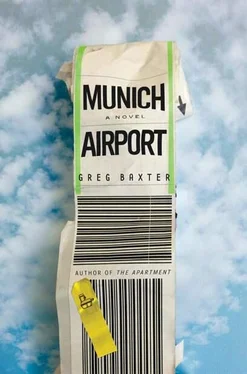During the policewoman’s explanation, a man crept up behind me, stopped a bit short, and whispered, loud enough to make it impossible to ignore him, Everything okay? I turned around and straightened up, and I was going to give him a thumbs-up and a smile, but then I saw he was pointing at his wrist, at the watch on his wrist, and he was irritated. Everything okay? he said again, but louder. I did not smile, but I held up two fingers and silently said, Two minutes. When the policewoman finished her explanation of death notifications, she turned her attention to our case, to Miriam. She had been discovered in her apartment. They had gone through her personal effects and found my contact details. A coroner’s inquest would follow as a matter of procedure, and then the body, Miriam’s body, would be released. How long? I asked. Not long, she said. Even though it did turn out to be long, I don’t think the policewoman was lying. It was just that not long meant something different to her than it meant to me. I asked what would happen once the body was released, and she gave me the contact details of somebody in the American embassy who had already been fully briefed, and who had asked that I call as soon as possible. That turned out to be Trish. I hung up. I went into the meeting room and told everybody I was sorry for the delay. There were no questions about the call, but there was a woman in the room who looked like she was going to ask, politely, if I needed to go home. In the room sat the director of marketing, the senior marketing manager, two senior sales managers — one of whom was the man who came out to the corridor to hasten me — and this woman, the one who seemed a little bit different from the rest, possibly from human resources, I can’t remember. The meeting room was in a refurbished part of a grand old building, and the walls of the room were glass, and we could see, and be seen by, several people working in other glass enclosures around us. I had been briefed about the project I’d been hired to work on, but now they gave me a more specific briefing. I offered some ideas I’d been developing. The director of marketing was a woman with a French name but a London accent. She had short gray hair. She was reassuringly intelligent. The senior marketing manager was younger than me, probably in her late twenties. The two sales managers — both men, one was short with red hair and one was tall with black hair — wore identical suits, and were either terrified of the director of marketing or hated her, but it was easy to see that without her leadership they’d have been lost. With every sentence I spoke, the woman who might have been in human resources seemed more and more disappointed in me. As a result, I became more and more disappointed in myself. The meeting ended, and everyone seemed satisfied, and I was surprised to find myself thinking that the presentation had been more convincing for the numbed manner with which I had delivered it. So I was weirdly excited to have passed the first hurdle so successfully and also, simultaneously, experiencing acute and brief paroxysms of devastation and anxiety. The lunch was to take place at a French restaurant I didn’t know. Presumably the folks from the Paris office knew it and liked it. Presumably it would be outrageously expensive. We would eat and eat and eat. The wine we would order would be unaffordable without business expensing, and even though it would be magnificent, we would all pretend it was merely adequate, and that we were accustomed to wine of that standard. I thought these things when they told me the name of the place — which I have forgotten — and they all turned out to be true. We ate so much we all felt sick. We had several courses and desserts, and we got drunk, especially the London team. The men and women from the Paris team were incredibly handsome, and they made the London team seem physically repellent — they would have done so to almost any nationality. They really were some of the most beautiful people I’d ever seen. The English, said one of the French guys in the bathroom — he was standing by the urinal, unzipping his pants, and I was washing my hands, looking up at him through the mirror — are a deformed and revolting race. I smiled. I have no idea if he knew I was American, and thought it might be funny to insult the English, or if he thought I was English, and wanted to let me know, in private, how much my face disgusted him. In any case, I told him I couldn’t argue, not if he were comparing the English to the French. My mother was beautiful — of Scottish descent, way back. It was too bad Miriam and I didn’t look more like her.
Between my induction meeting and the lunch, I took a walk. The director of marketing wanted me to tour around the place and meet some of the staff, find out what they did and why they did it, but I wanted to call my father and the embassy in Berlin. I apologized and assured her it was quite important that I make a telephone call to the US, and promised to meet everyone at the restaurant. Outside, the day was still cold, still windy, still overcast. I thought it might rain, but I don’t believe — when I try to remember — that it did. Or if it did, it must have been very light rain. I walked much farther than I expected to walk. I walked out the doors of the building where the aerospace firm was and pulled my phone out, but I didn’t make the call. I put the phone back in my pocket and walked up toward Covent Garden, then a little bit farther, winding around, looking in shop windows, looking into cafés and businesses. I hadn’t consciously intended to walk to Bedford Square when I started out. I just kept making turns that led me in its direction. I just kept considering and rejecting, for no real reason, all the quiet spots I came across, all the spots from which I could have made a phone call. Bedford Square is a place I’ve always had a strange attraction to, and I’m sure that at some point during my walk a voice inside my head said, Well, I guess we’re heading to Bedford Square again. I hadn’t been there for a year or so, ever since the last time I met a woman I was seeing.
The park in Bedford Square is off-limits to nonresidents, but there are a few benches just outside the black wrought-iron fence that surrounds the park. The woman I had an affair with mysteriously had a key — I think it was because she worked for the British Museum. I sat for a moment on one of those benches, but it was so cold that I got up and began to pace around the park very slowly. The square was, as it always is, exceptionally quiet. The trees are immense, and even though the park was wintery and the trees had no leaves, the branches scattered way up high and dominated the view of the sky. I stared for a while, right up at them. It’s still strange, to me, after all the times I’ve visited, to find such a pleasant and untrampled section of London less than a few blocks from Oxford Street and Tottenham Court Road, which can feel, at certain times of day, like hell on earth. You can find quiet squares all over Bloomsbury. Places nobody knows about, or places too dull to visit. Bedford Square was one of the first places where I sat down and thought, I’m in London, and for that reason it acquired a sacred status in my thoughts. As I paced, slowly, around the outside of the park, I took the phone out, went over what I might say to my father, then called. It rang about five times. My father usually picks up immediately. Suddenly I remembered the time difference. It was six in the morning there. I hung up. A moment later my phone was ringing. It was my father calling me back. I didn’t answer. I could not think of a way to tell him. I’d need another couple of hours. I stopped pacing, because now I felt really foolish for not having stayed with the marketing director and toured the office with her. I stood very still and thought about hurrying back. But I had been walking for a while, and it actually wasn’t long until lunch began. I could head to the restaurant, get there a few minutes early, have a drink. I watched a gray Mercedes take a very, very long time to park in a space that was probably too small for it. A man stepped out. I could not see his face, but he had silver hair. He examined his parking job, decided he did not approve, and got back in to do it again. I walked to a different corner of the park, so I would not have to watch. I called the number I’d been given for the woman in the US embassy in Berlin. Trish answered. She was professional but warm, and asked how I was coping. Well, I said, it’s a shock, though I haven’t seen her in years, we spoke less than I’d have liked. Trish said, It’s difficult to keep in touch when you live in different countries. I said, I never went to Berlin to see her, I should have. Trish didn’t respond, and I said, Listen, sorry, in the shock of everything I forgot to ask the policewoman how Miriam died. Trish said, Are you asking me to tell you now?
Читать дальше











